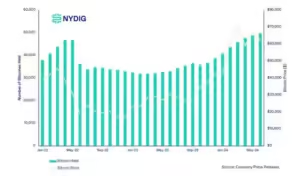US Financial Advisors Finally Warm to Bitcoin

QuickTake:
- Financial advisors in the US are increasingly open to incorporating Bitcoin into portfolios.
- Ric Edelman, founder of DACFP, highlights the shift due to data showing better risk-adjusted returns.
- Edelman underscores the importance of advisors understanding crypto to best serve their clients.
In a significant shift within the financial advisory community, Bitcoin is finally gaining acceptance among US financial advisors. Ric Edelman, founder of the Digital Assets Council of Financial Professionals (DACFP), has shed light on this growing trend, attributing it to compelling data that demonstrates improved risk-adjusted returns when Bitcoin is included in investment portfolios.
The Changing Attitude of Financial Advisors: For years, Bitcoin faced skepticism from traditional financial advisors, who often viewed it as too volatile and speculative to be a reliable investment. However, the tide is turning as more advisors recognize the potential benefits of incorporating Bitcoin into their clients’ portfolios. This change is largely driven by a growing body of data that highlights Bitcoin’s performance and its ability to enhance portfolio diversification and risk-adjusted returns.
Edelman’s Perspective: Ric Edelman, a prominent figure in the financial advisory industry and the founder of DACFP, has been a vocal advocate for the integration of digital assets into traditional investment strategies. In a recent discussion, Edelman emphasized the crucial role that financial advisors play in the crypto space. He argued that to serve their clients effectively, advisors must not only understand but also embrace cryptocurrencies.
According to Edelman, the reluctance of financial advisors to engage with Bitcoin is diminishing as they become more educated about its potential benefits. He pointed out that Bitcoin’s historical performance data has been particularly persuasive, showing that it can offer improved risk-adjusted returns compared to traditional assets. This realization is prompting advisors to reconsider their stance and explore ways to incorporate Bitcoin into their clients’ investment strategies.
Importance of Education: Education is a central theme in Edelman’s advocacy for Bitcoin adoption among financial advisors. He believes that a lack of understanding has been a major barrier to acceptance. To address this, DACFP offers resources and training programs designed to equip financial professionals with the knowledge they need to navigate the crypto space confidently.
Edelman argues that by gaining a deeper understanding of Bitcoin and other digital assets, advisors can make more informed decisions and provide better guidance to their clients. This is particularly important as client interest in cryptocurrencies continues to grow. Many investors are looking to diversify their portfolios with digital assets, and they rely on their advisors to provide expert advice on how to do so safely and effectively.
Improved Risk-Adjusted Returns: One of the key factors driving the shift in attitudes is the compelling data on Bitcoin’s risk-adjusted returns. Studies have shown that including Bitcoin in a diversified portfolio can improve its overall performance. This is because Bitcoin’s price movements are often uncorrelated with traditional asset classes, providing a hedge against market volatility.
For example, during periods of economic uncertainty or market downturns, Bitcoin has sometimes performed well, offering a counterbalance to declines in stocks or bonds. This characteristic makes it an attractive addition to portfolios looking for enhanced diversification and potential protection against market risks.
Client Demand: The growing interest in Bitcoin among financial advisors is also a response to increasing client demand. As more investors become aware of Bitcoin and its potential benefits, they are seeking advice on how to incorporate it into their investment strategies. Financial advisors who ignore this demand risk losing clients to competitors who are more knowledgeable and open to digital assets.
Edelman highlights that advisors need to be proactive in educating themselves about Bitcoin and other cryptocurrencies to meet this rising client interest. By doing so, they can position themselves as forward-thinking professionals who are capable of guiding their clients through the complexities of the evolving financial landscape.
Navigating Regulatory Challenges: While the acceptance of Bitcoin is growing, financial advisors must also navigate regulatory challenges associated with digital assets. The regulatory environment for cryptocurrencies is still evolving, and advisors need to stay informed about the latest developments to ensure compliance with legal requirements.
Edelman advises that advisors should stay abreast of regulatory changes and work with legal experts to understand the implications for their practice. This proactive approach can help advisors mitigate risks and provide sound advice to their clients.
Looking Ahead: As Bitcoin continues to gain traction among financial advisors, the future looks promising for its integration into mainstream investment strategies. The growing body of data supporting Bitcoin’s role in portfolio diversification and risk management is likely to further drive its acceptance.
Financial advisors who embrace Bitcoin and educate themselves about its potential benefits are well-positioned to serve their clients’ evolving needs. By doing so, they can enhance their value proposition and stay ahead in an increasingly competitive industry.
In conclusion, the warming attitude of US financial advisors towards Bitcoin marks a significant development in the financial industry. Driven by compelling data on risk-adjusted returns and increasing client demand, advisors are beginning to recognize the importance of incorporating Bitcoin into their investment strategies. As education and understanding of digital assets improve, advisors will be better equipped to navigate the complexities of the crypto space and provide effective guidance to their clients.



